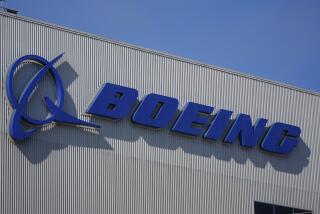UAW Picks Ford as Target for Negotiations : Labor: Job security and sharing of health costs with employees are key issues. Both sides expect agreement before a strike is called.
DEARBORN, Mich. — Declaring health benefits and job security its key issues, the United Auto Workers union Monday picked Ford Motor Co. as its target in negotiations for a new contract with the Big Three auto makers.
Under the union’s pattern bargaining approach, the contract reached with Ford will be used as a model for separate agreements to be worked out later with General Motors Corp. and Chrysler Corp.
The current three-year industry contract, which covers about 400,000 hourly workers, expires Sept. 14. Both sides expressed optimism that an agreement can be reached by the deadline and that no strike will occur.
UAW President Owen Bieber said the union’s executive board unanimously voted to take on Ford because the company is the healthiest of Detroit’s auto makers. Ford had net income of $1.35 billion in the first half of 1993.
Jack Hall, the company’s chief negotiator, said Ford is pleased to be the target because it will have more say about the terms of the industry’s deal with its hourly workers.
“Anytime you are the first and have the opportunity to influence the pattern, it can be to your advantage,” he said.
The choice of Ford is likely to increase the pressure on Chrysler and GM to grant more concessions to the union than they would otherwise, analysts said. GM, in particular, is facing serious financial problems that make the new contract extremely important.
“It raises the pressure on GM and increases the chances of a strike at GM,” said David Healy, an analyst with S.G. Warburg & Co.
The union and auto makers began negotiations June 24 and have settled many minor matters. But they appear far apart on other subjects, particularly the crucial issue of health care.
Ford says that to be competitive it must reduce its health care costs, which amounted to $1.5 billion last year and have escalated at an annual rate of 13% since 1970. The company has suggested that union members pick up some costs in the form of deductibles and insurance co-payments.
The UAW adamantly opposes any contribution from workers.
“We are not going to be making co-payments on our insurance,” Bieber said.
The union also wants to maintain its current job and income-security package, which provides nearly full pay and benefits for workers who are laid off. Ford appears willing to concede on this issue because its plants are running near capacity and it is more likely to be hiring than firing in the next year.
The security issue is more volatile for GM, which must close plants and lay off thousands of workers in the next two years. A $3.5-billion job security fund it established in 1990 was exhausted in March, and GM wants to cut back the size of the fund for future years.
Also likely to be on the table in the Ford-UAW talks are a lower wage scale for new hires and greater use of non-union-made parts. The UAW opposes both.






